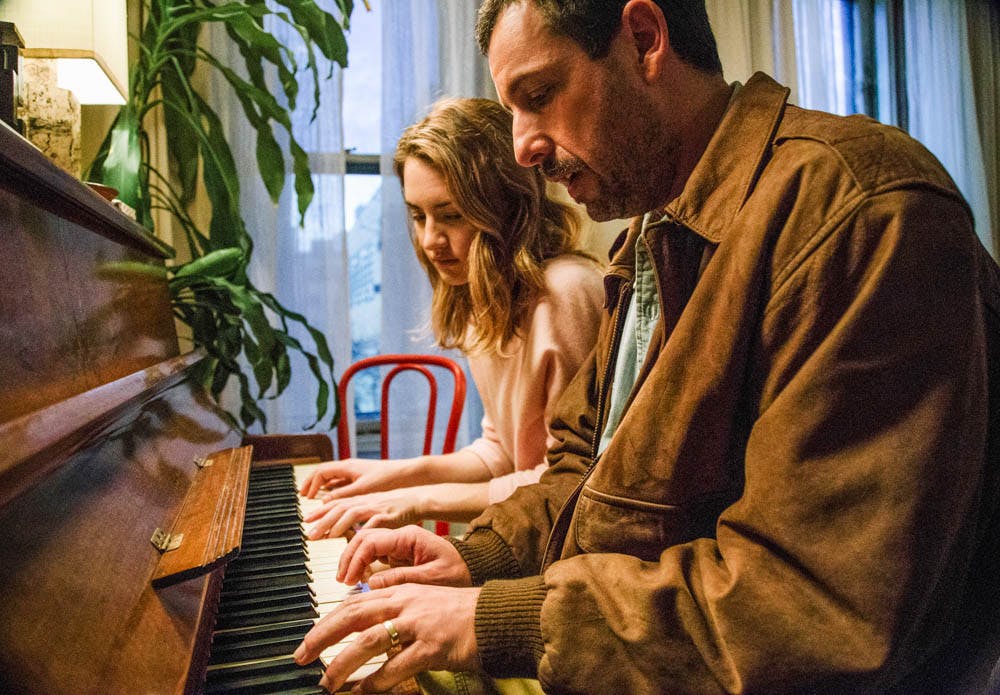Parents raise us and then they haunt us. Sometimes it turns out alright — we live up to our parents’ expectations, or they learn to adjust them. But sometimes the tension between the adult a parent imagines and the adult the child becomes never goes away.
In “The Meyerowitz Stories (New and Selected),” that tension is painfully present. Directed by Noah Baumbach, whose work often deals with the white American intelligentsia, the Netflix original film focuses on three adult siblings and their troubled relationship with their father, the sculptor and former college professor Harold Meyerowitz, portrayed by Dustin Hoffman.
Like many of Baumbach’s films, “The Meyerowitz Stories” wears its cheeky erudition on its sleeve, and makes plain its literary aspirations. The film is divided into chapters, announced via title cards that bear Franzen-esque introductory sentences.
The first chapter centers on the eldest son, Danny (Adam Sandler) a “house husband” and failed musician. Coming out of a divorce and with a daughter going off to college, Danny is living with his father and wonderfully tipsy step-mother, Maureen (Emma Thompson) in their Manhattan apartment.
The fact that Sandler can act isn’t news, but it is easy to forget. In “The Meyerowitz Stories,” he issues a clarion reminder. That this is the film in which he does so, though, is surprising — there’s something strange, for instance, about seeing Sandler attend an opening at the Metropolitan Museum of Art. Nevertheless, he turns in a loose, funny performance as Danny, softening his normal man-child persona into something sadder and more real.
To his father, Danny is a disappointment. But so are all of Harold’s children to varying degrees. Born to different women and leading different lives, none of them are close. His younger son, Matthew (Ben Stiller) is on edge as a wealthy business manager in Los Angeles, and his daughter, Jean (Elizabeth Marvel), perfectly dry, works at Xerox in Rochester. They have respectable lives, but to Harold’s dismay, none of them are artists.
Spend one minute with Harold Meyerowitz and you’ll know he’s an artist — not because he scowls and smokes American Spirit cigarettes by the pack, but because he’ll tell you. In fact, that’s probably all he’ll talk about. Harold sounds as though he learned to speak by reading back issues of the Oxford Art Journal, and he often turns his scholarly assessments inward, offering astute observations of his own work to no one in particular. But his behavior masks the fragile ego of a man who never found the success and celebrity he wanted in life. Now in his 70s and staring down the barrel of obscurity, his most exciting prospect is being featured in a group show at Bard College where he has taught for decades.
As Harold, Hoffman offers a tragicomic tour de force of a performance. Hilariously passive-aggressive at first, Hoffman gradually reveals the man’s delusions and humiliations, shifting Harold back and forth between being the film’s most frustrating character and its most affecting.
His children know this seesaw well. When Harold eventually lands in the hospital, they all travel to see him. Daniel and Matthew have an especially hard time managing their feelings — it’s hard to be angry at a bedridden old man, even if he wasn’t a great father. They ask their sister Jean why she always shows up for Harold. She replies, “because I’m a decent person.”
It’s a simple but stinging rebuke, in line with the torturous moral reasoning and introspection that Baumbach is a master of conveying. But one does get the sense that Baumbach is trying to have his cake and eat it too, using his female character to call out the two brothers on their egotism and masculine posturing even as he indulges that very behavior. The film cements this perception when, later on, a fight between Danny and Matthew turns into a wrestling match. Grown men tussling has to clear a high bar of dramatic motive to be worth putting on screen, and the bar knocks Baumbach squarely in the shins this time around.
Baumbach also exhibits an occasional tendency to overwrite, aiming and largely failing to achieve a heightened, anxious poetry in his dialogue. Most of the time, though, the writing is as funny and touchingly human as his best work.
Baumbach remains a smart cinematic craftsman. The character dynamics of a scene play out in the camera movement — he often tracks his characters as they walk away from and toward each other, letting one actor pull the frame along until the others catch up and assert their own dominance over the image. And as he proved in his 2015 feature “Mistress America,” Baumbach and editor Jennifer Lame have an irreverent visual style that yields hysterical and poignant results.
Perhaps the great hope of the film, and the family, is the relationship between Danny and his daughter Eliza (Grace Van Patten). She is an intelligent, creative young woman, a freshman at Bard and an aspiring filmmaker; it seems Danny has managed to avoid the parenting mistakes of his father. Something tells us he’ll be a good ghost.





